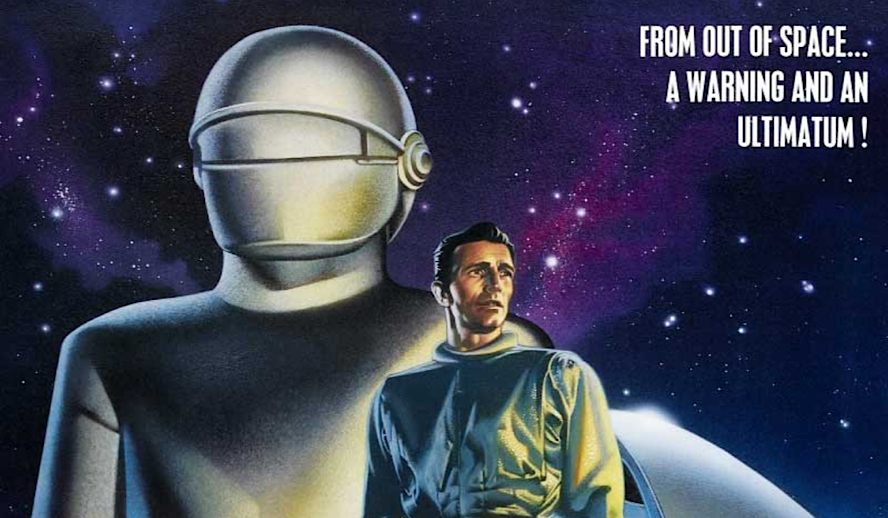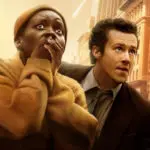Table of Contents

Photo: ‘The Day the Earth Stood Still’
The Cold War Heats Up
Given the developing story of Russia’s invasion of Ukraine, an event that has much of the world watching and hoping with immeasurable anxiety, it feels like such an international conflict is unprecedented — which it may well be for most people currently living. Yet history has the funny habit of working in cycles, and there was a time not too long ago when the fear of nuclear holocaust loomed over everyone’s heads. By 1950, tensions between the United States and the Soviet Union had escalated to the point where both powers were testing nuclear weapons, with Europe split in two by the so-called “iron curtain.” In February 1950, Wisconsin Senator Joseph McCarthy made a now-infamous speech, claiming that there were communist infiltrators in the American government; the rest after that was history.
Related article: OSCAR-NOMINATED – EXCLUSIVE: ‘Dune’ Full Commentary, Reactions, Making Of – Timothee Chalamet, Zendaya, Oscar Isaac
Related article: OSCAR-NOMINATED – ‘House of Gucci’ Full Commentary & Behind the Scenes – Lady Gaga, Adam Driver, Jared Leto, Al Pacino
Related article: OSCAR-NOMINATED – ‘Belfast’ Full Commentary & BTS – Jamie Dornan, Caitriona Balfe, Judi Dench
Related article: OSCAR-NOMINATED – ‘West Side Story’ Full Commentary – Rita Moreno, Steven Spielberg, Rachel Zegler
Related article: OSCAR-NOMINATED – ‘No Time to Die’ Full Commentary, Behind the Scenes & Reactions, Daniel Craig, Rami Malek, Bond
‘The Day the Earth Stood Still’ premiered in September 1951, a seminal Cold War science fiction fable that became a great movie almost by accident. The film is based very loosely on a short story by sci-fi pulp author Harry Bates, titled Farewell to the Master, and while both Bates and his short story are now relegated to obscurity, the film adaptation has firmly kept its place as one of the defining sci-fi outings of the 1950s. But why? Certainly, the film is well-made, as I’ll explain soon, but ‘The Day the Earth Stood Still’ has outlasted even its dubious 2008 remake largely because of its moral seriousness. Indeed, ‘The Day the Earth Stood Still’ has proven itself to be more socially relevant, and more prophetic, than most “respectable” non-genre films.
This article will discuss plot spoilers for a movie that is now over 70 years old.
‘The Day the Earth Stood Still’ – Intruders from the Stars
Before we are even introduced to any of the main characters, the film drives home one of its themes (that being mankind’s xenophobia) as soon as the opening credits have finished, with a flying saucer landing in Washington, D.C. Newspapers and radio stations from around the world take notice of the visitor from another planet, with thousands of spectators and military personnel at the landing site. Finally, the spaceship opens up, and we are introduced to Klaatu, a man-like alien in a spacesuit — along with Gort, his robot companion. Klaatu takes out what appears at a glimpse to be a weapon, and is promptly wounded by one of the soldiers surrounding the spaceship; of course, the “weapon” turns out to be a device that would have allowed mankind to study life on other planets.
Related article: EVOLUTION: Every Henry Cavill Role From 2001 to 2021, All Performances Exceptionally Poignant
Related article: EVOLUTION: Every Chris Evans Role From 1997 to 2020, All Performances Exceptionally Poignant
While recovering from his injuries, Klaatu asks to speak with the world’s leaders — all of them; naturally, this goes nowhere, and Klaatu is held in detention. Once he has escaped, Klaatu goes under the alias of “John Carpenter” (both a Christ allusion and an unintentional reminder of John Carpenter, the real-life filmmaker), and decides to live among some local D.C. residents. The bulk of the film is thus spent on Klaatu developing relationships with Helen, a single mother, and her son Bobby — as well as Professor Barnhardt, a scientist sympathetic to Klaatu’s intentions. Klaatu is a member of an advanced civilization that has apparently solved the problem of war, and has been sent to Earth to convince the world’s governments to prevent nuclear catastrophe; the alternative to de-escalation is death for all mankind. Earth will either prove itself as not a threat to other civilizations in the universe, or it will face annihilation.
A Small Film with Big Ideas
The 1951 version of ‘The Day the Earth Stood Still’ works largely because of its simplicity; it runs at only 92 minutes long, has a small main cast, and has a modest budget for a major studio production. For a sci-fi movie, there aren’t a lot of special effects on display, with Gort (a man in a suit), the flying saucer (kept mostly off-screen), and some subtle optical effects being the highlights. The film’s modesty, however, should not be confused with a lack of talent behind the scenes; quite the contrary, some of the talent here is nothing short of major. Robert Wise was fairly early into his directing career, but he had previously worked as the film editor on none other than ‘Citizen Kane’, and he would later win Oscars for ‘West Side Story’ (the 1961 version) and ‘The Sound of Music.’ Composer Bernard Herrmann had also worked on ‘Citizen Kane’, and would become perhaps most famous for composing the score for Alfred Hitchcock’s ‘Psycho.’
Related article: #metoo Revolution: Powerful Questions That Need Answers
Related article: FACT-CHECKED Series: Timothee Chalamet and 32 Facts about The Young Superstar
Wise’s experience as an editor all but certainly contributed to the film’s water-tight pacing, always focused on the central message and minimizing anything that could undermine it. For example, I reckon that a film with a looser framework would more strongly emphasize the implied romantic tension between Helen and Klaatu (Helen’s other “love interest” being a wet towel certainly helps Klaatu’s case), but while there is a bit of tension, it’s not enough to distract from the narrative’s throughline. Similarly, characters more or less function only so far as they can contribute to the narrative; Helen and Bobby are shown as fundamentally good people, which helps sway Klaatu into thinking that maybe Earth can be spared. Overall, this is a movie that is zeroed in on its themes, much to its overall benefit.
Killer Robots and Nuclear Weapons
I brought him up earlier, but I think now is as good a time as any to talk about Gort, easily the most recognizable element of the movie. Gort is iconic, I suppose in part because his design (like several other things about the movie) is so simple; he is a tall metal man, not made with complex moving parts or even the sleekness of the robot from Fritz Lang’s ‘Metropolis’, but something even more streamlined. Gort is basically a cyclops, with a laser beam under his visor that can vaporize inanimate objects — and even people. Gort is Klaatu’s trump card during his talks with Earth’s leaders and military; Klaatu doesn’t seem capable of much on his own, but a highly advanced robot-like Gort could wipe out a whole species if given the order. In a way, Gort is like Klaatu’s atomic bomb — except Gort can only act in defense.
Related article: MUST WATCH – The Hollywood Insider’s CEO Pritan Ambroase’s Love Letter to Black Lives Matter – VIDEO
Subscribe to The Hollywood Insider’s YouTube Channel, by clicking here.
The fear of nuclear devastation, that one of the world powers can launch bombs or even nuclear missiles overnight, lies at the heart of ‘The Day the Earth Stood Still.’ Farewell to the Master was published in 1940, prior to the United States even entering WWII, but its film counterpart is distinctly concerned with post-war anxiety about the standoff between the U.S. and U.S.S.R. — a standoff that would last more than 40 years. The film’s ending, in which Klaatu warns the leaders of the world’s disparate governments that de-escalation and cooperation are the only viable options, must have struck certain viewers as strongly anti-war (even unpatriotic) in 1951. To think, though, that more than 70 years have gone by, and yet we still have to contend with tyrants, imperialism, war, famine, and even something that the film did not account for: climate change. We sure do have our work cut out for us.
Related article: The Hollywood Insider’s CEO Pritan Ambroase: “The Importance of Venice Film Festival as the Protector of Cinema”
Related article: The Masters of Cinema Archives: The Hollywood Insider Pays Tribute to ‘La Vie En Rose’, Exclusive Interview with Director Olivier Dahan
Related article: – Want GUARANTEED SUCCESS? Remove these ten words from your vocabulary| Transform your life INSTANTLY
We Don’t Need to Escalate
‘The Day the Earth Stood Still’ was one of the earliest anti-war movies to be released during the Cold War, and almost certainly the first that can be classified as science fiction. While the galactic organization that Klaatu works for might sound dictatorial to some ears, this is actually an optimistic reading of mankind’s place in the universe; the truth of the matter is that if we find ourselves on the brink of nuclear catastrophe, there will be no one in all of known space to help us. Earth is a little blue rock, floating in space, and if we are to destroy ourselves (either with weapons or the long-term effects of climate change), then that will be the end of it. ‘The Day the Earth Stood Still’ seems to have the message of, “Clean your house, or else someone will come along to make you clean it,” but the deeper message is even more foreboding: We, as a species, are the only ones responsible for what happens to us.
Limited Time Offer – FREE Subscription to The Hollywood Insider
It’s possible to deliver a well-intentioned message while also delivering a mediocre film, but ‘The Day the Earth Stood Still’ is a remarkable showcase of craftsmanship and single-minded determination, between Robert Wise’s stoic direction, Bernard Herrmann’s iconic score (featuring one of the first uses of the theremin in Cinema history), Michael Rennie’s otherworldly performance as Klaatu, etc. Some genre “classics” from decades ago do not hold up well, but I believe this one does.
‘The Day the Earth Stood Still’ is currently streaming on Hoopla and fuboTV.
By Brian Collins
Click here to read The Hollywood Insider’s CEO Pritan Ambroase’s love letter to Cinema, TV and Media. An excerpt from the love letter: The Hollywood Insider’s CEO/editor-in-chief Pritan Ambroase affirms, “We have the space and time for all your stories, no matter who/what/where you are. Media/Cinema/TV have a responsibility to better the world and The Hollywood Insider will continue to do so. Talent, diversity and authenticity matter in Cinema/TV, media and storytelling. In fact, I reckon that we should announce “talent-diversity-authenticity-storytelling-Cinema-Oscars-Academy-Awards” as synonyms of each other. We show respect to talent and stories regardless of their skin color, race, gender, sexuality, religion, nationality, etc., thus allowing authenticity into this system just by something as simple as accepting and showing respect to the human species’ factual diversity. We become greater just by respecting and appreciating talent in all its shapes, sizes, and forms. Award winners, which includes nominees, must be chosen on the greatness of their talent ALONE.
I am sure I am speaking for a multitude of Cinema lovers all over the world when I speak of the following sentiments that this medium of art has blessed me with. Cinema taught me about our world, at times in English and at times through the beautiful one-inch bar of subtitles. I learned from the stories in the global movies that we are all alike across all borders. Remember that one of the best symbols of many great civilizations and their prosperity has been the art they have left behind. This art can be in the form of paintings, sculptures, architecture, writings, inventions, etc. For our modern society, Cinema happens to be one of them. Cinema is more than just a form of entertainment, it is an integral part of society. I love the world uniting, be it for Cinema, TV. media, art, fashion, sport, etc. Please keep this going full speed.”
More Interesting Stories From The Hollywood Insider
– Want GUARANTEED SUCCESS? Remove these ten words from your vocabulary| Transform your life INSTANTLY
– A Tribute to Martin Scorsese: A Complete Analysis of the Life and Career of the Man Who Lives and Breathes Cinema
– Do you know the hidden messages in ‘Call Me By Your Name’? Find out behind the scenes facts in the full commentary and In-depth analysis of the cinematic masterpiece
– A Tribute To The Academy Awards: All Best Actor/Actress Speeches From The Beginning Of Oscars 1929-2019 | From Rami Malek, Leonardo DiCaprio To Denzel Washington, Halle Berry & Beyond | From Olivia Colman, Meryl Streep To Bette Davis & Beyond
– In the 32nd Year Of His Career, Keanu Reeves’ Face Continues To Reign After Launching Movies Earning Over $4.3 Billion In Total – “John Wick”, “Toy Story 4”, “Matrix”, And Many More
The Day the Earth Stood Still, The Day the Earth Stood Still, The Day the Earth Stood Still, The Day the Earth Stood Still, The Day the Earth Stood Still, The Day the Earth Stood Still, The Day the Earth Stood Still, The Day the Earth Stood Still, The Day the Earth Stood Still, The Day the Earth Stood Still, The Day the Earth Stood Still, The Day the Earth Stood Still, The Day the Earth Stood Still, The Day the Earth Stood Still, The Day the Earth Stood Still, The Day the Earth Stood Still, The Day the Earth Stood Still, The Day the Earth Stood Still, The Day the Earth Stood Still, The Day the Earth Stood Still, The Day the Earth Stood Still









